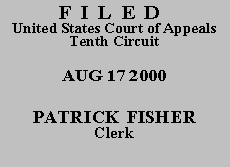

| SANDRA MARSH,
Petitioner-Appellant, v. TOM NEWTON, Warden; ATTORNEY GENERAL FOR THE STATE OF NEW MEXICO, Respondents-Appellees. |
|
Petitioner-Appellant Sandra Marsh appeals from the district court's order denying her petition for writ of habeas corpus pursuant to 28 U.S.C. § 2254. Appellant was convicted in state court of conspiracy to traffic in a controlled substance and trafficking in a controlled substance. After exhausting her state remedies, she brought this petition in federal district court. A federal magistrate judge recommended that her petition be denied, and his recommendation was adopted by the district court.
This matter comes before us on appellant's request for a certificate of appealability (COA).(1) Appellant requires a COA to proceed on appeal, and we may issue one only if she has "made a substantial showing of the denial of a constitutional right." 28 U.S.C. § 2253(c)(2). To make a substantial showing, an applicant must show that her petition "raises[es] issues that are debatable among jurists, or that a court could resolve the issues differently, or that the questions deserve further proceedings." United States v. Sistrunk, 111 F.3d 91, 91 (10th Cir. 1997).
Appellant raises the following issues: (1) the state's failure to disclose the existence of taped conversations prior to trial violated her right to due process; (2) the state court's failure to declare a mistrial based on the undisclosed tapes chilled her right to testify in her own behalf and otherwise violated her constitutional rights; (3) she received ineffective assistance of counsel at trial; (4) there was not sufficient evidence to support her convictions; and (5) she received ineffective assistance of counsel at sentencing. Having carefully reviewed appellant's brief, the record, and the applicable law, we conclude that she has failed to make a substantial showing of the violation of a constitutional right. Accordingly, her request for a COA is DENIED, and this appeal is DISMISSED.
Entered for the Court
Circuit Judge
*. This order and judgment is not binding precedent, except under the doctrines of law of the case, res judicata, and collateral estoppel. The court generally disfavors the citation of orders and judgments; nevertheless, an order and judgment may be cited under the terms and conditions of 10th Cir. R. 36.3.
1. Appellant requested a certificate of probable cause. Although this case was filed in district court prior to the effective date of the AEDPA amendments to § 2253, this appeal was filed afterwards and she therefore requires a COA to proceed on appeal. See Slack v. McDaniel, 120 S. Ct. 1595, 1602-03 (2000).